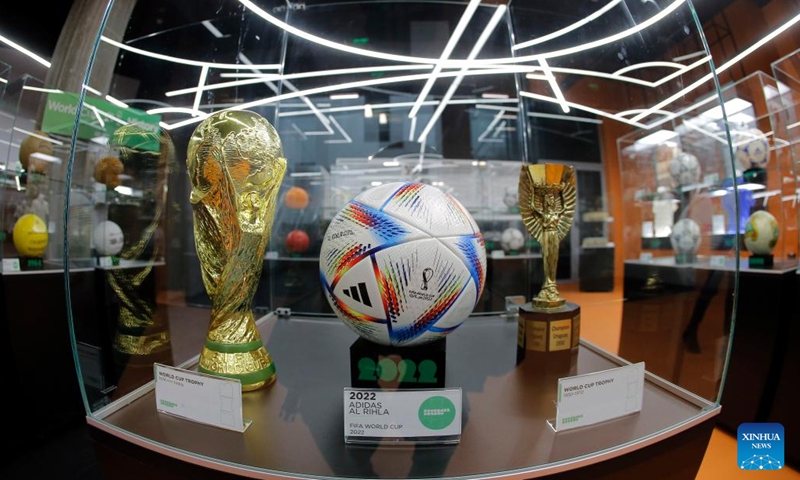SPORT / SOCCER
China, Qatar launch soccer communication events

World Cup trophies and the official football for the upcoming FIFA World Cup Qatar 2022 are seen on the opening day of a football museum in Bucharest, Romania, Nov. 1, 2022. The museum, first of its kind in Romania, hosts various objects from football history, shirts and boots belonging to famous players and various recreational places.(Photo: Xinhua)
China and Qatar will cooperate during the upcoming World Cup to launch various soccer-related events in both countries, and at the same time taking the chance to look at the roots of the game in Zibo, an ancient town in East China’s Shandong Province.
A series of international online and offline events will be launched in both Zibo and Qatar’s capital city Doha, the culture and tourism department of the Shandong government announced on Wednesday.
The events include exhibitions of soccer history in China, known as cuju in ancient times, as well as exchanges among young soccer players from China and Qatar.
Jointly held by The Department of Culture and Tourism of Shandong Province, China’s embassy in Qatar and other institutions, the event will also include the release of documentaries in both countries looking at the origins of soccer.
As the countdown to the World Cup proceeds, elements from China can be seen in every corner around Doha, from the main stadium of the World Cup to the recent arrival of giant pandas in the Middle East and sponsorship from Chinese companies.
On November 9, The Qatar Central Bank launched a special edition commemorative banknote for the 2022 World Cup, featuring the Lusail Stadium constructed by China Railway Group.
The stadium, located 15 kilometers north of Doha, has a capacity of 92,000, and it will hold the opening and closing ceremonies.
In addition, Chinese referees including Ma Ning, Shi Xiang and Cao Yi have also been included in the World Cup referee list.
“We hope that the communication events between Zibo and Doha can add more on top of the shining Chinese elements during the World Cup,” noted the Shandong culture and tourism department in the announcement.
In 2004, FIFA recognized cuju as the prototype of the world modern soccer game, with the city of Zibo as the birthplace.
As a sport as well as an art, cuju has served as a relic of ancient China which has been listed among the first batch of national intangible cultural heritage. From the Stratagems of the Warring States to the Records of the Grand Historian, cuju events repeatedly appear in historic records in China.
To better introduce cuju, traditional performances will also be shown at the FIFA Fan Festival to be held inside Al Bidda Park in Doha next Monday.
